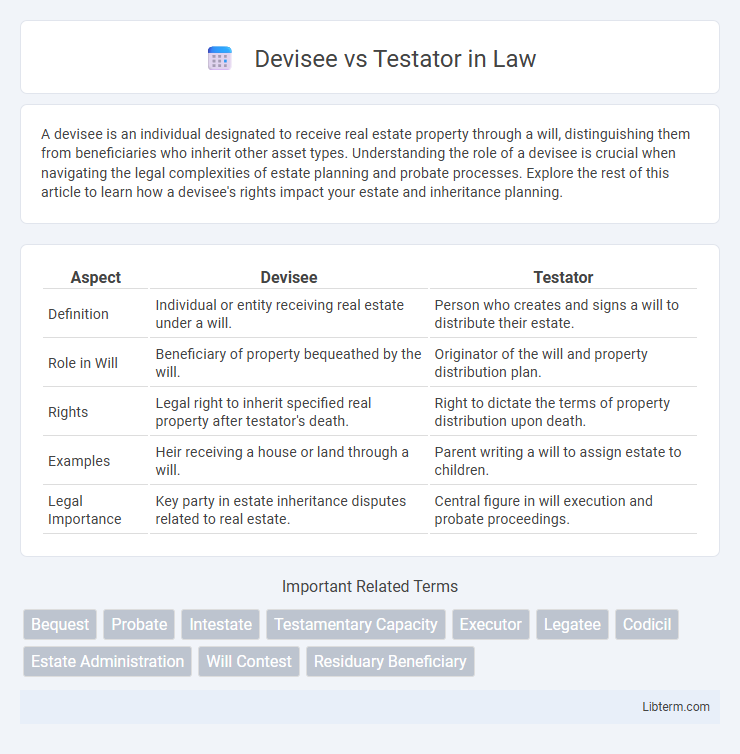A devisee is an individual designated to receive real estate property through a will, distinguishing them from beneficiaries who inherit other asset types. Understanding the role of a devisee is crucial when navigating the legal complexities of estate planning and probate processes. Explore the rest of this article to learn how a devisee's rights impact your estate and inheritance planning.
Table of Comparison
| Aspect | Devisee | Testator |
|---|---|---|
| Definition | Individual or entity receiving real estate under a will. | Person who creates and signs a will to distribute their estate. |
| Role in Will | Beneficiary of property bequeathed by the will. | Originator of the will and property distribution plan. |
| Rights | Legal right to inherit specified real property after testator's death. | Right to dictate the terms of property distribution upon death. |
| Examples | Heir receiving a house or land through a will. | Parent writing a will to assign estate to children. |
| Legal Importance | Key party in estate inheritance disputes related to real estate. | Central figure in will execution and probate proceedings. |
Understanding the Terms: Devisee and Testator
A testator is an individual who creates a will to specify how their assets and property should be distributed after death, while a devisee is the person or entity designated to receive real property or real estate under the terms of that will. Understanding these roles is crucial in estate planning, as the testator holds the power to allocate assets, and the devisee benefits directly from the instructions laid out in the will. The distinction between personal property beneficiaries and devisees, who specifically inherit real property, often affects the legal handling of estate distribution.
Legal Definitions: Who is a Devisee?
A devisee is an individual or entity designated in a will to receive real estate or immovable property upon the testator's death. Unlike a testator, who is the person creating and authorizing the will, the devisee holds a beneficiary role, inheriting specific assets outlined in the testamentary document. Legal definitions distinguish devisees by their entitlement to real property, whereas beneficiaries may inherit personal property or other types of assets.
Legal Definitions: Who is a Testator?
A testator is an individual who creates a valid will to distribute their estate after death, clearly outlining beneficiaries and asset allocations. Unlike a devisee, who is the recipient of real property through the will, the testator holds the legal authority to specify terms and conditions for property transfer. The testator's intent and capacity are crucial factors in the will's enforceability under estate law.
Key Differences Between Devisee and Testator
A testator is the individual who creates a will and outlines the distribution of their estate upon death, while a devisee is the person or entity designated in the will to receive real property. Key differences include the testator's role as the originator of the testamentary instructions, whereas the devisee is the beneficiary of those instructions. The testator must have legal capacity to make a valid will, while a devisee's rights arise only upon the testator's death and the will's probate.
Roles and Responsibilities of a Testator
A testator is the individual who creates and executes a valid will, dictating the distribution of their assets and property upon death. They hold the primary responsibility to clearly articulate their intentions, appoint executors, and ensure the will complies with legal standards to avoid disputes. Unlike a devisee, who is a beneficiary receiving real property under the will, the testator actively controls the estate planning process and final asset allocations.
Rights and Expectations of a Devisee
A Devisee holds the right to receive real property as designated in a will, granting them legal entitlement upon the testator's death. Their expectations include a clear transfer of ownership free from disputes, contingent on the will's validity and the probate process. Unlike a testator, who creates the will, the Devisee's rights are passive and dependent on the testator's explicit directives and adherence to estate laws.
Devise vs. Bequest: Clarifying Terminology
A devise refers to the transfer of real property through a will, while a bequest specifically involves the gifting of personal property. The term devisee identifies the person receiving real estate under the will, contrasting with a legatee who inherits personal property. Understanding these distinctions clarifies testamentary language and ensures precise interpretation of wills during estate administration.
Legal Process: From Will Creation to Asset Distribution
The testator is the individual who creates a will, specifying how their assets should be distributed after death, while the devisee is the person designated to receive real property or other assets through the will. The legal process begins with the drafting and signing of the will by the testator, followed by probate, where the court authenticates the will and oversees asset distribution. During probate, the devisee's entitlement is verified, and the executor ensures that the testator's instructions are legally executed, transferring property accordingly.
Common Legal Issues Involving Devisees and Testators
Disputes between devisees and testators often arise over ambiguous will language, resulting in challenges to testamentary intent and asset distribution. Common legal issues include claims of undue influence, mental incompetence of the testator, and failure to comply with formal will execution requirements. Resolving these conflicts typically involves probate court interventions to interpret the testator's intentions and ensure equitable fiduciary duties are upheld.
Importance of Clear Wills in Estate Planning
Clear wills are crucial in estate planning to distinctly identify the devisee, the person designated to receive specific property, and the testator, the individual creating the will. Ambiguities between devisee and testator roles can lead to legal disputes, delaying asset distribution and increasing costs. Precise language and explicit instructions help honor the testator's intent, ensuring a smooth, efficient transfer of assets to the designated devisees.
Devisee Infographic

 libterm.com
libterm.com